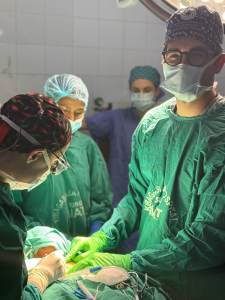We partner with Rwandan surgeons, trainees and anesthesiologists to treat patients with large goiter, conduct education and skills training seminars with the local otolaryngology residents and graduate clinicians.
I am with Dr. Merry Sebelik
Rwandans suffer from a high prevalence of symptomatic goiters and other thyroid mass lesions. There is a severe shortage of thyroid surgeons to meet the demand. Our organization has a long
partnership with local surgeons in Kigali and Gitwe, Rwanda to care for patients through collaborative surgery, and to conduct
multidisciplinary training sessions in thyroid related skills such as
point-of-care ultrasound.
Each yearly mission, we participate in the care of 30-40 thyroid
surgery patients, but more critically impart skills that are being
transferred to the local clinicians, and contribute to the local
otolaryngology residency program.






During my week in Rwanda, I was fortunate to help provide care for patients in need as part of a multidisciplinary surgical team composed of surgeons, anesthesiologists, CRNAs, and scrub technicians from multiple U.S. institutions. Together, we worked at Kibagabaga Hospital in Kigali, Rwanda to deliver safe, high-quality thyroid surgery and to strengthen collaboration with our Rwandan colleagues.
On our first day, we established a pre-operative clinic, where we evaluated patients, reviewed laboratory studies, and performed physical examinations to assess surgical readiness. One of the most impactful tools we incorporated was point-of-care ultrasound (POCUS), which allowed us to assess thyroid gland anatomy and evaluate vocal cord motion pre-operatively. This technology enhanced our ability to plan surgery safely and provided an opportunity to educate both patients and local providers about its clinical utility, laying the groundwork for continued use in the future.
Over the following five days, we performed a series of thyroid surgeries, treating patients suffering from long-standing thyroid disease. Each day, we were joined by groups of medical students, residents, and nurses who observed and participated in the operating room. These moments of shared learning created a collaborative environment—one in which we learned from the local providers’ experience, resourcefulness, and clinical insight, while also sharing surgical techniques and perspectives from our own practice.
One of the highlights of the trip was the successful implementation of recurrent laryngeal nerve monitoring, the first time this technology had ever been used at Kibagabaga Hospital. In partnership with Neuromonitoring Associates (NMA), we were able to bring the necessary equipment and demonstrate how this innovation can enhance surgical safety by protecting vocal cord function. Seeing this milestone achieved was one of the coolest parts of the trip, symbolizing the power of partnership and shared commitment to patient safety.
In addition to operative work, we gave a series of lectures and discussions on thyroid anatomy, surgical technique, anesthesia physiology, and postoperative care. These sessions were well attended by medical students, residents, and local providers, fostering an atmosphere of enthusiasm and exchange that extended well beyond the operating room.
It was an honor to be part of this mission and to witness the compassion, skill, and dedication of everyone involved. I believe we were able to make a lasting difference—not only for the patients who received life-changing care, but also for the students, residents, and providers who engaged in an inspiring week of education and teamwork. Most importantly, we built partnerships—and friendships—that I hope will continue to grow for years to come.
It was one of the best weeks of my life. I miss the trip and think about it constantly. The country is beautiful and the people are so great. This experience has made me want to do global surgery work every year for the rest of my life.
I can't wait to go back.
Sincerely,
David Zachariah Allen, MD